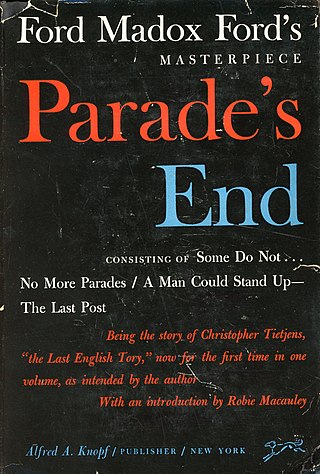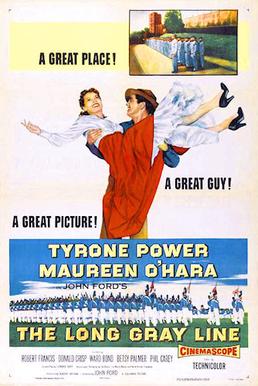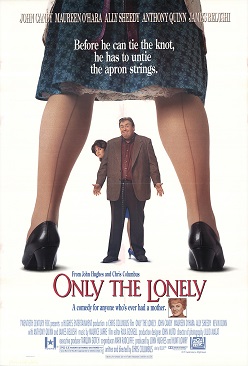
Maureen O'Hara was an Irish-born naturalized American actress and singer, who became successful in Hollywood from the 1940s through to the 1960s. She was a natural redhead who was known for playing passionate but sensible heroines, often in Westerns and adventure films. She worked with director John Ford and long-time friend John Wayne on numerous projects.

Appointment in Samarra, published in 1934, is the first novel by American writer John O'Hara (1905–1970). It concerns the self-destruction of the fictional character Julian English, a wealthy car dealer who was once a member of the social elite of Gibbsville. The book created controversy due to O'Hara's inclusion of sexual content.

Parade's End is a tetralogy of novels by the British novelist and poet Ford Madox Ford, written from 1924 to 1928. The novels chronicle the life of a member of the English gentry before, during and after World War I. The setting is mainly England and the Western Front of the First World War, in which Ford had served as an officer in the Welch Regiment, a life he vividly depicts. The individual novels are Some Do Not ... (1924), No More Parades (1925), A Man Could Stand Up — (1926) and Last Post (1928).

Promises, Promises is a musical with music by Burt Bacharach, lyrics by Hal David and a book by Neil Simon. It is based on the 1960 film The Apartment written by Billy Wilder and I. A. L. Diamond. The story concerns a junior executive at an insurance company who seeks to climb the corporate ladder by allowing his apartment to be used by his married superiors for trysts.

Lisa Grimaldi is a fictional character from the CBS soap opera, As the World Turns. The character was portrayed by Eileen Fulton for 50 years from May 1960, until the last episode aired in September 2010, with Fulton becoming one of the longest-serving soap opera actors in the United States. Lisa is considered to be the first soap "vixen" and was one half of the first ever super couple, Bob and Lisa Hughes.

The Long Gray Line is a 1955 American Cinemascope Technicolor biographical comedy-drama film in CinemaScope directed by John Ford based on the life of Marty Maher and his autobiography, Bringing Up the Brass, co-written with Nardi Reeder Campion. Tyrone Power stars as the scrappy Irish immigrant whose 50-year career at West Point took him from a dishwasher to a non-commissioned officer and athletic instructor.

Penelope is a 2006 British-American fantasy romantic comedy film directed by Mark Palansky and starring Christina Ricci, James McAvoy, Catherine O'Hara, Peter Dinklage, Richard E. Grant, and Reese Witherspoon. The film tells the story of the titular Penelope Wilhern, who was born with the snout of a pig due to a curse that was placed on her family by a vengeful witch.

Cat's Cradle: Warhead is an original novel written by Andrew Cartmel and based on the long-running British science fiction television series Doctor Who. It features the Seventh Doctor and Ace. This novel is the second book in the Cat's Cradle sequence, and also forms the first part of a trilogy of novels by Cartmel, the others beings Warlock and Warchild.

The Black Swan is a 1942 American swashbuckler Technicolor film directed by Henry King and starring Tyrone Power and Maureen O'Hara. It was based on the 1932 novel of the same title by Rafael Sabatini.

Only the Lonely is a 1991 American romantic comedy-drama film written and directed by Chris Columbus, produced by John Hughes, and stars John Candy, Maureen O'Hara, Ally Sheedy and Anthony Quinn. The film is a comedic take on the premise established in the 1953 television play Marty and the 1955 film Marty, while the title comes from the song "Only the Lonely" by Roy Orbison. The story follows a bachelor who is looking to settle down and start a family with a mortuary beautician, while coping with his controlling mother who wants him all to herself.

To the Shores of Tripoli is a 1942 American Technicolor film directed by H. Bruce Humberstone and starring John Payne, Maureen O'Hara and Randolph Scott. The film was produced by Darryl F. Zanuck. Its cinematography was nominated for an Academy Award in 1943.

"Chuck Versus the Suburbs" is the thirteenth episode of the second season of Chuck. It originally aired on February 16, 2009. General Beckman sends Chuck Bartowski, Sarah Walker, and John Casey to a Los Angeles suburb on an undercover mission, with Chuck and Sarah posing as a married couple. After accidentally obtaining a part of Fulcrum's Intersect data, Chuck discovers that the suburban development is a front for Fulcrum. The team is captured by some of their neighbors, including Brad and Sylvia, who test Chuck by uploading their prototype to Chuck's brain. Meanwhile, Big Mike is introduced to internet dating by Morgan Grimes, Lester Patel, and Jeff Barnes at the Buy More, which backfires on Morgan.

Some Do Not ..., the first volume of Ford Madox Ford's highly regarded Parade's End tetralogy, was originally published in April 1924 by Duckworth and Co. The following is a summary of the plot, chapter by chapter.

A Man Could Stand Up — is the third novel of Ford Madox Ford's highly regarded sequence of four novels known collectively as Parade's End. It was first published in 1926.

Last Post is the fourth and final novel of Ford Madox Ford's highly regarded sequence of four novels, Parade's End. It was published in January 1928 in the UK by Duckworth, and in the US under the title The Last Post by Albert and Charles Boni, and also the Literary Guild of America.

Monamour is a 2006 Italian erotic romance film directed by Tinto Brass.

Parade's End is a five-part BBC/HBO/VRT television serial adapted from the eponymous tetralogy of novels (1924–1928) by Ford Madox Ford. It premiered on BBC Two on 24 August 2012 and on HBO on 26 February 2013. The series was also screened at the 39th Ghent Film Festival on 11 October 2012. The miniseries was directed by Susanna White and written by Tom Stoppard. The cast was led by Benedict Cumberbatch and Rebecca Hall as Christopher and Sylvia Tietjens, along with Adelaide Clemens, Rupert Everett, Miranda Richardson, Anne-Marie Duff, Roger Allam, Janet McTeer, Freddie Fox, Jack Huston, and Steven Robertson.

The Greatest Battle is a 1978 Euro War film co-written and directed by Umberto Lenzi and starring an all-star ensemble cast, including Giuliano Gemma, Helmut Berger, Stacy Keach, Ray Lovelock, Samantha Eggar, Henry Fonda, Evelyn Stewart, and John Huston. The Italian-West German-Yugoslavian co-production was produced by Mino Loy and Luciano Martino for Titanus. It was also released under the titles The Biggest Battle and Battle Force. The plot centers on a group of German and Allied nationals throughout the early years of World War II, including a British commando (Gemma), an American general (Fonda) and his son (Lovelock), a Jewish actress (Eggar), a war correspondent (Huston), and two very different German officers. The film climaxes in a recreation of the Battle of the Mareth Line in Tunisia.

Parole Girl is a 1933 American pre-Code romantic drama film directed by Edward Cline. The film stars Mae Clarke and Ralph Bellamy.

Anybody's Blonde is a 1931 American Pre-Code mystery film directed by Frank R. Strayer from an original screenplay by Betty Burbridge. The film stars Dorothy Revier, Reed Howes, and Edna Murphy, and was released by Action Pictures on November 17, 1931.





















